A healthy nudge: How conversational AI can take the strain off healthcare

There is no denying the fact that people are living longer – so much so, that centenarians are actually the fastest growing age group in the UK. On the surface, this is great news and a testament to advances in medical science. Yet in a time of resource strain and budget cuts within the NHS, this increase in life expectancy – and resulting growth in the number of people who may be living in ill health - is putting added pressure on our healthcare system.
In order to satisfy this rising demand for high quality and targeted healthcare, it’s important to make sure that the population at large understands and, more importantly, adheres to their wellbeing and healthcare plans. However, in the UK there just aren’t enough healthcare professionals to ensure people get help to truly stay on top of this. Therefore, we should be looking at technology, and in particular, conversational artificial intelligence (AI), to help engage people seeking to achieve a healthier lifestyle or follow their care plans, in order to reduce the pressure on the system and improve health outcomes.
Digitising the nudge theory
Healthcare professionals can leverage the ‘nudge theory’, to help people stick to their care plan and guide them towards making better decisions regarding their health, by delegating some of the ‘nudging’ to a conversational AI-powered assistant. The nudge theory, which was made famous by Nobel Laureates Richard Thaler and Daniel Kahneman, found that subtly influencing people to change their behaviours was a far more effective means of motivation than actually telling them to do so, and that frequent communications and engagement leads to better results.
Nudging people to take better care of themselves at home, versus hands-on care for avoidable complications in hospitals or care facilities, greatly reduces the number of ‘bed-blockers’, which add an unnecessary and costly strain to the healthcare system and leads to poorer health experience and outcomes for patients.
While undoubtedly, regular check-ins from human care providers are needed, virtual assistants can provide the always-on support and access to personalised information that allows many patients to self-care from home under the remote supervision of a doctor or caregiver. For example, they can assist a patient in ordering prescriptions, remind them how to use healthcare devices they use routinely such as an inhaler, as well as giving them proactive reminders to take their medication. Virtual assistants can help healthcare engagement extend beyond the few hours of consultations that even chronic patients typically receive over a year, by giving such patients timely support, information and reminders.
See also
- Harnessing the power of technology to facilitate a paperless NHS
- athenahealth agrees to a $5.7bn acquisition deal
- The role of pharma packaging innovation in tackling antibiotic resistance
Redefining at-home care
Most health systems are increasingly seeking to shift care from the hospital to the home, as it provides a better experience and in many circumstances is both safe and more effective to do so. By being able to provide support, advice and information without the need for a healthcare professional, AI can help patients better manage their conditions and general health from the comfort of their own homes. Although a conversational AI should by no means replace the care given by a doctor or nurse, virtual assistants have the potential to redefine how at-home care is conducted, which would significantly reduce the pressure on our healthcare system.
With conversational assistants giving patients more control over their healthcare needs such as accessing information about their condition and care, re-ordering their own prescriptions, or rescheduling tests and appointments, experienced caregivers and nurses can be freed up from routine interactions. When staff are liberated from the mundane aspects of their jobs, their roles can evolve to focus on their uniquely human skills such as problem solving, listening and interpersonal communication — all of which are of utmost importance in caregiving.
This increased engagement can benefit workers by making their work more rewarding and fulfilling. In another way, it can also help tackle the healthcare system’s deepening staffing crisis, which earlier this year it was revealed to be at ‘breaking point’ with one in ten nurses leaving the NHS each year. By alleviating some of the workload and giving healthcare professionals more time to focus on the most important part of their job – actually caring for their patients - AI-powered conversational assistants could also help reduce the growing healthcare staff churn within the NHS.
Time for change
If the current strains on the NHS are to continue, we simply won’t have the doctors or nurses to provide the care that this country needs. Despite the government pledging an additional £20.5bn for the NHS as part of this year’s Autumn Budget, this doesn’t account for the deficit already in the healthcare system, and the fact that according to the WHO, the world will be short of 12.9 million health-care workers by 2035.
Therefore, we need to start taking advantage of advances in technology, notably in the form of conversational assistants, to free up hospital resources and reduce the mounting pressure on the NHS. There is no doubt that the adoption of AI in the healthcare industry will augment the experience, quality, access and efficiency of the system. Not only will it empower patients, helping them stick to their treatment plans so they can better self-manage their conditions, but crucially it will also support so many overworked and demoralised healthcare professionals by relieving them from the high volume of administrative tasks, so they can focus on delivering quality care.
Conversational assistants hold the key to rescuing the NHS from its continued plight of staff shortages, underfunding and rising hospital admissions, but the government and the NHS must embrace these new technologies for them to really have an impact.






